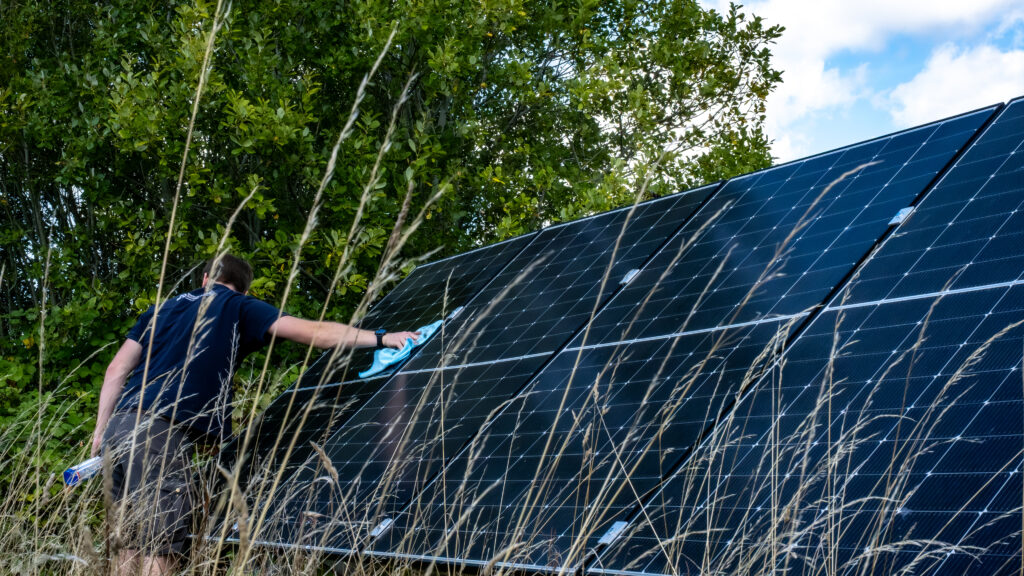
Taking action to lower our carbon footprint
The science is clear: to tackle climate change, we need to minimise our environmental impacts as soon as we can.
Here’s how NCAS is taking action to lower our carbon footprint:
We use solar energy systems to power atmospheric chemistry laboratories and observatories in York, Weybourne, and Rothamsted in the UK – enabling lower carbon research into air pollutants, greenhouse gas levels, and flying insects!
Storm-tracking weather radars were powered with biofuel for the first time. A pair of steerable weather radar were powered by GreenD+ HVO biofuel generators, instead of diesel fuel sourced from crude oil, which reduced greenhouse gas emissions by up to 90%.
We invested in an electric-powered ground power unit and aircraft tug, in a significant move towards reducing carbon emissions from our research aircraft’s operation.
Solar panels and wind turbines provided energy at a remote camp on Greenland’s ice sheet summit – making a research team’s daily life and measurements of melting ice and climate conditions possible. Find out about the ICECAPS-MELT research project.
We got access to a reliable store of sustainable aviation fuel, after new fuel storage and aircraft fuelling infrastructure was installed at Cranfield Airport. This means our FAAM Airborne Laboratory’s research aircraft can fill up on sustainable aviation fuel when it flies from its home base in Bedfordshire.
Alongside other signatories of the Concordat for the Environmental Sustainability of Research and Innovation, we commit to taking immediate and ongoing action to reduce our organisation’s environmental footprint. We’ve embarked on an annual environmental impact accounting and reporting process, to continue exploring ways to reduce the impacts associated with our science.
We encourage staff to choose climate conscious work travel options, such as video conferencing, active travel, public transport, and renting ultra low emissions vehicles.
We encourage staff to choose products and services with lower environmental footprints, working with suppliers that uphold strong environmental and ethical standards, and promoting circular economy principles through reuse, refurbishment, and recycling.
We try to optimise the use of equipment and infrastructure through collaboration, support the donation and repurposing of equipment to extend its useful life, and follow institutional best practice for waste and asset disposal.
We recognise the efforts of our staff, by sharing their best practice and integrating environmental sustainability criteria into our annual Atmospheric Stars Awards.
This was all made possible through the commitment of our staff, and advice, collaboration, or funding from our host institutions, research partners, and wider environmental science community.
– Sophie Clay, NCAS Environmental Sustainability Manager
What’s on the horizon?
We are working towards minimising the environmental impacts of using artificial intelligence for research.
We have teams working towards Green DiSC, a digital sustainable computing certification that provides a roadmap to tackle the environmental impacts of our computing activities.
Our Forecasting Operations for Research Campaigns and Experiments (FORCE) team have created user-friendly systems for accessing and analysing mission forecast data quickly and intuitively, to support quick decision-making about the feasibility of field experiments. FORCE will enable researchers to deploy and operate science equipment during optimum conditions, and avoid wasted resources.
We’re exploring the replacement of existing diesel-powered ground cooling equipment for our research aircraft, with electric-powered units.
Even more solar power will be installed at the Cabo Verde NCAS atmospheric observatory to support crucial long-term measurements in the tropical marine environment.
A brand-new solar farm will supply 65% of the electricity demand from The University of Manchester. This will help provide clean energy to NCAS’s offices and laboratories based there.
We’re in the early stages of sourcing an electric vehicle to replace an existing diesel mobile laboratory at the University of York, which is used to measure air pollution emissions and test the effectiveness of policy or technological changes on air quality.
